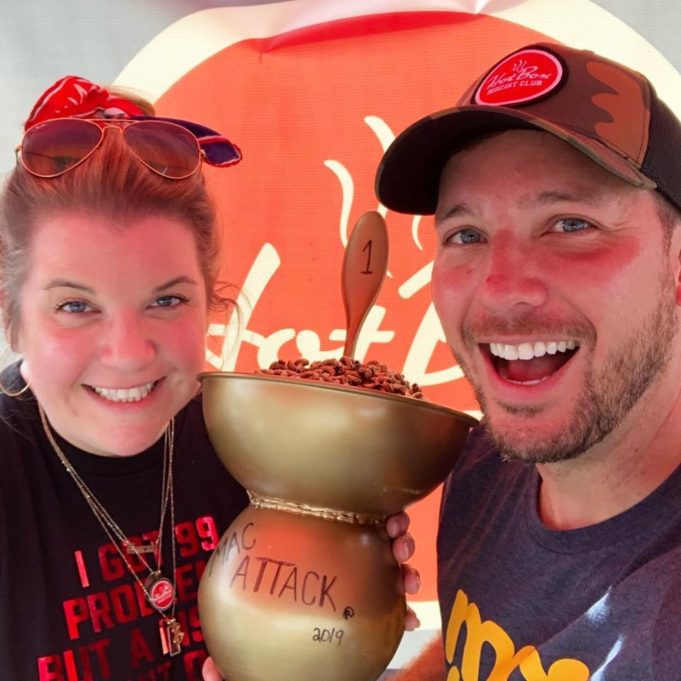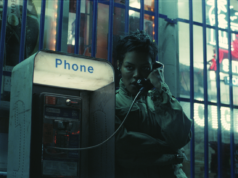The owners of Hot Box Biscuit Club were frazzled already, even before their brusque reply to a Facebook message prompted a social media firestorm, protests in front of their business, and threats to their livelihoods.
“We are running a busy restaurant,” said Sarah Hooton, who co-owns Hot Box with Matt Mobley. “There are days that we are there 12 to 15 hours and don’t get to eat.”
In October, Hooton and Mobley opened their restaurant on Main Street on the Near Southside and were becoming established slowly before the pandemic hit hard in March.
The next three months were a blur, Hooton said, running the dining room at 50% occupancy while also providing curbside and home delivery, neighborhood drop-offs, and family meals.
The pace is hectic.
“We feel like we are running five restaurants in one every day,” Mobley said.
The owners and employees have been wearing masks and gloves to ensure customer safety, have been spacing out the tables, and have been studying and following federal guidelines to stay open.
“We’ve been a little stressed to say the least,” Hooton said.
It was in this setting that Hooton received a private message from a stranger, Elsa Ruggiero, who owns a local salon. Ruggiero was polite but direct. She had noticed that Hot Box used African-American pop culture references as inspiration for the titles of Hot Box menu items. A pork biscuit, for example, is called Notorious P.I.G, and you can wash it down with Ice T. You get the idea.
“I don’t particularly jump at the chance to give my opinion on how someone else chooses to brand or run their business,” Ruggiero wrote to Hot Box at 10:17 a.m. on Saturday.
She was dismayed that Hot Box was using African American culture to sell food but had been “completely silent on the topic of racial injustice and police brutality in our nation.” She didn’t like how the restaurant “can benefit so much from black culture and be silent on black issues.”
Ruggiero further requested a statement that revealed the restaurant owners’ feelings and asked the owners to promote local black businesses on their social media.
“Thanks,” Hooton responded.
The one-word reply didn’t appease Ruggiero.
“So what’s your plan moving forward?” she wrote back.
“None of your concern,” Hooton responded.
“It is absolutely my concern,” Ruggiero said.
“It actually is not your concern,” Hooton said. “But thanks.”
That snippy exchange might have ended the conversation, but a half-hour later, Ruggiero shared the private message on her public Facebook page with a long post describing how she’d been given the brush-off by a closed-minded business owner who was appropriating black culture while refusing to take a stance on black issues.
The post went viral and has been shared 220 times. The more than 350 comments on Ruggiero’s post ranged from criticizing Hot Box’s menu, food, and owners to disparaging Ruggiero for being a busybody. Both businesses began receiving one-star reviews on Yelp and other sites in retaliation.
At 1:40 p.m. that day, Hot Box issued an apology to Ruggiero on its Facebook page and said, “We back our black community and black businesses.”
The post received more than 1,300 comments, many of them from people doubting the apology’s genuineness.
“What a half-assed apology,” one wrote.
I wrote about the flap on Blotch and posted it on our Facebook page. It received 25,000 hits, 49 shares, and 95 comments. People were angry at Hot Box for their response, at Ruggiero for being a “Karen,” and at the Weekly for reporting the incident.
On Sunday, protesters showed up outside Hot Box and were peaceful.
Hooton and Mobley have since removed the pop cultural references from their menus.
“We completely changed our menu –– the menu names, the descriptors,” Mobley said.
Hooton said the menu had been crafted based on their shared love of music of all types. Mobley and Hooton are both French-trained chefs with a love of Southern food like Grandma used to make. Both grew up in Fort Worth, with Hooton graduating from Eastern Hills High School and Mobley graduating from Western Hills High School. Both say they love Fort Worth, which is why they opened their business here.
They originated their biscuit/Southern food concept while doing pop-up brunches where everyone would sit together family-style. At these gatherings, they would play the music they both grew up on and adored –– Beastie Boys, Snoop Dogg, Dolly Parton, Prince, Amy Winehouse, and many others of various genres. That’s what prompted the menu names.
The pop culture references, Hooton said, were “in no way, shape, or form ever meant to be offensive to anyone, so, if it is, we will absolutely take that down. We are in the hospitality business and want to make people happy. We definitely don’t want to be offensive to anyone.”
The owners reached out to the Fort Worth Black Chamber of Commerce to “see how we can collaborate and work with them to reach more of the African-American business community,” she said.
They are researching other African-American groups to cultivate relationships with as well, Mobley said.
“We don’t see any of this as damage control,” Mobley said. “It’s an opportunity to be better. When we created Hot Box and the concept, we thought about it a long time and really envisioned an inclusive place. You come, you gather, share the love of good food and community. Our dining room is fashioned after the pop-ups with tons of long communal tables. Come in, sit with your Southside neighbors, eat, drink. You’re best friends afterward.”
After they posted their apology, some commenters blasted them again for not saying specifically that black lives matter.
“We believe that black lives matter,” Mobley said. “We’ve learned that not being racist isn’t enough. We need to do our part to really combat racism.”
In hindsight, what does Hooton think about Ruggiero’s initial message that led to the flap.
“I thought it was a good question,” Hooton said. “If I could redo that, I would say, ‘I welcome the opportunity to talk to you about that.’ I was too curt. I should have been better. That doesn’t reflect the person I am. That reflects a stressful situation for me in the restaurant, but I thought they were good points, and that’s something I would like to talk to her about at some point.”












Now THAT is a perfect example of how we can be more aware and make change happen!
I am not sure how or why anyone can say using these names on their menu can be concidered racist. This is getting ridiculous! What if white, Hispanic, or other cultures choose to protest the black businesses & ask them to change names to another reference other than black? What if we went into their businesses & protested & disrupted the patrons? What if we went & destroyed property that is named after a black person? That is being predjudice to all other cultures. This cry baby crap needs to stop & people need to act like adults & quit wearing a chip on their shoulder. This only creates more chaos. It would be interesting to know how many of these protesters are so called Africans? Were they born in Africa or the United States? Get real people!😡
Wow. Really? I guess if their menu only offered items named using white pop culture, they would have been attacked for that. Some people need to get a life.